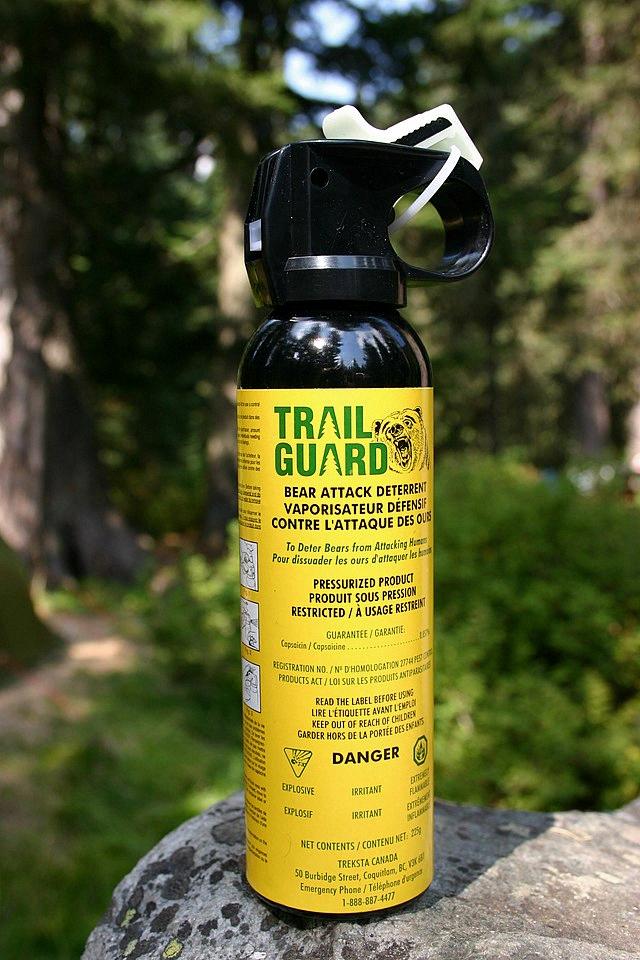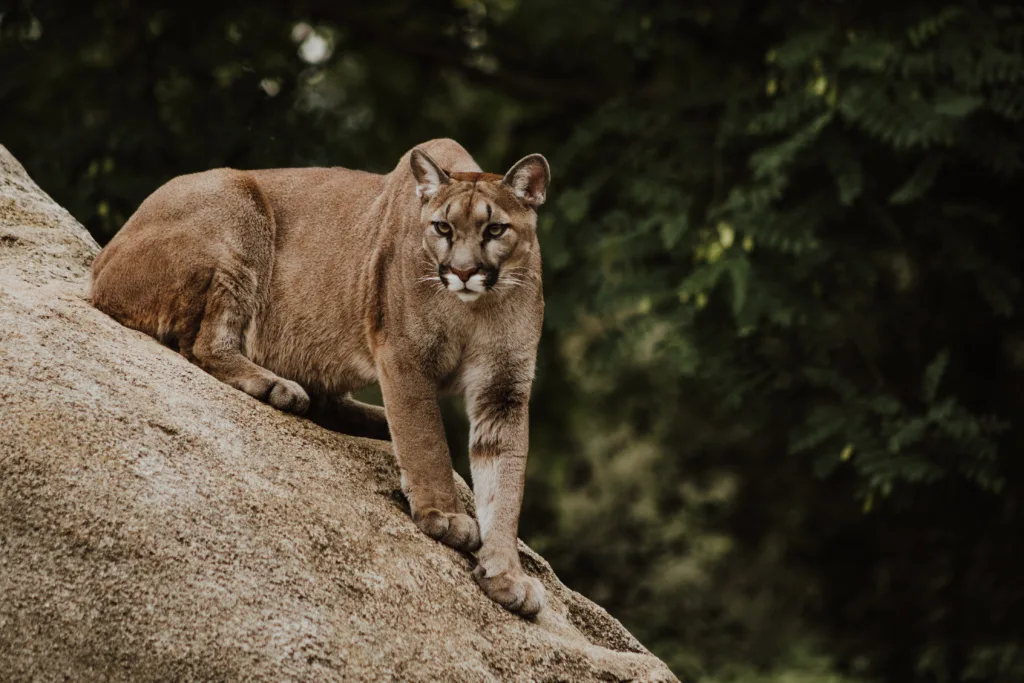Mountain lions, also known as cougars, pumas, or panthers, are large, solitary cats that inhabit parts of North and South America. These majestic animals are known for teir agility, strength, and incredible hunting abilities. While mountain lion attacks on humans are rare, it’s important to be prepared and take safety precautions when hiking or camping in their territory.
One of the most effective ways to protect yourself from mountain lions is to carry bear spray. Although it’s called bear spray, it can be used against almost all mammals, including mountain lions. When choosing a bear spray, it’s essential to look for the highest concentration of capsaicin, which is currently 2%. Capsaicin is the active ingredient in pepper spray that causes irritation and burning in the eyes, nose, and throat.
Using bear spray against a mountain lion is a last resort and should only be used if the animal is showing aggressive behavior towards you. If you do encounter a mountain lion, it’s important to make yourself look big and intimidating. Stand tall, raise your arms, and open your jacket if you’re wearing one. Make loud noises, shout, and use a firm tone of voice. Don’t turn your back on the mountain lion or run away, as this can trigger its hunting instincts.
If the mountain lion continues to approach you, use your bear spray. Aim for the eyes and nose, and spray in short bursts. Bear spray can travel up to 30 feet, so you don’t need to be too close to the animal to use it effectively. Once you’ve sprayed the mountain lion, back away slowly and leave the area as quickly as possible.
It’s important to note that bear spray is not a guarantee of safety and should only be used as a last resort. The best way to protect yourself from mountain lions is to avoid hiking or camping alone, make noise while on the trail, and keep a close eye on children. If you do encounter a mountain lion, stay calm, use your best judgment, and remember that these animals are an important part of our ecosystem and should be respected from a safe distance.
The Effectiveness of Bear Spray on Cougars
Yes, you can spray a cougar with bear spray. Bear spray is actually a recommended defense against cougars as it contains a high concentration of capsaicin, which is an irritant that can case temporary blindness, coughing, and breathing difficulties in animals (including cougars) that come into contact with it. However, it’s important to remember that bear spray is not a guaranteed solution and should only be used as a last resort if you cannot safely retreat or scare off the cougar using other methods. When using bear spray, aim for the cougar’s face and spray in short bursts to create a cloud of spray that will impair the cougar’s ability to see and breathe. It’s also important to practice using the bear spray beforehand and to carry it in an easily accessible location so that you can quickly deploy it in case of an emergency.

Source: academy.com
Effectiveness of Bear Repellent on Cougars
Yes, bear repellent also kown as bear spray is an effective deterrent against cougars. Bear spray contains capsaicin, which is a natural chemical found in peppers that irritates the eyes, nose, and lungs of animals, causing them to retreat. Cougars, like bears, have a sensitive sense of smell and are also affected by the strong odor of the spray. In fact, many wildlife experts recommend carrying bear spray when hiking or camping in cougar country as a first line of defense against a possible encounter. It is important to note that while bear spray can be effective against cougars, it is always important to take precautions and avoid areas where cougars are known to frequent. If you do encounter a cougar, it is important to remain calm, make yourself appear larger, and slowly back away while keeping eye contact with the animal.
The Effectiveness of Pepper Spray on Mountain Lions
Yes, pepper spray is an effective defense against mountain lions. These big cats have highly sensitive noses and eyes, and when they encounter pepper spray, their eyes will tear up, and their respiratory system will be affected by the chemical compound capsaicin. This will cause them to experience difficulty breathing and even temporary blindness, making them less likely to attack. It’s important to note that while pepper spray can be effective, it’s alays best to avoid a confrontation with a mountain lion if possible and to be aware of your surroundings when hiking or camping in areas where they may be present.
Scaring Away a Mountain Lion
If you encounter a mountain lion, it’s important to know that they are generally solitary animals and tend to avoid humans. However, if you do come face-to-face with one, it’s important not to run, as this may trigger their instinct to chase. Instead, you should try to make yourself appear larger by opening your jacket or raising your arms above your head. You can also try to make noise by shouting, clapping, or banging sticks together to make yourself seem more intimidating. If you have children with you, pick them up and keep them close to you. It’s important to maintain eye contact with the mountain lion, but avoid direct staring as this may be seen as a threat. If the mountain lion approaches you, continue to make noise and try to scare it away by throwing rocks or oher objects in its direction. Remember, it’s important to stay calm and assertive in the presence of a mountain lion, as panicking or running may only make the situation worse.
The Effectiveness of Tasers on Mountain Lions
Mountain lions, also known as cougars, are dangerous wild animals that can pose a threat to humans in certain situations. While Tasers can be effective in stopping humans and other animals, their effectiveness against mountain lions is somewhat limited.
Tasers work by firing two probes on 15- to 35-foot lines, and thee probes must hit the target to be effective. If both probes hit the mountain lion, the Taser will deliver a powerful electric shock of 5,000 volts that can temporarily paralyze the animal’s nervous system and cause pain.
However, there are several factors to consider when using a Taser on a mountain lion. Firstly, it can be challenging to get close enough to a mountain lion to use a Taser effectively, as these animals are fast and agile. Additionally, mountain lions have a thick layer of fur and muscle, which can make it difficult for the probes to penetrate deep enough to have an impact on the animal’s nervous system.
Furthermore, a Taser may not be effective against a mountain lion that is in a highly agitated state, as the animal’s adrenaline may override the effects of the electric shock. In such a situation, it may be more effective to use other methods, such as bear spray or firearms, to protect oneself from the mountain lion.
In conclusion, while a Taser can potentially be used to stop a mountain lion if the conditions are right, it is not always the most effective method of self-defense against these wild animals. It is important to exercise caution and seek professional advice before attempting to use a Taser or any other method of self-defense against a mountain lion.

Source: en.wikipedia.org
How to Avoid Attracting Mountain Lions
If you live in an area where mountain lions are known to roam, it is important to take measures to avoid attracting them to your property. Here are some tips to help keep mountain lions away:
1. Keep garbage bins securely closed: Mountain lions are attracted to the smell of food, and garbage can provide an easy meal. Make sure your garbage bins are securely closed and stored in a location that is not easily accessible to wildlife.
2. Keep pets indoors: Small pets can attract mountain lions, which may see them as prey. Keep your pets indoors, especially at night, and do not leave pet food outside.
3. Install motion-sensor lighting: Mountain lions are generally nocturnal animals, and they are less likely to approach a well-lit area. Installing motion-sensor lighting around your property can help deter them from coming too close.
4. Clear brush and debris: Mountain lions are known to use dense brush and other debris as hiding places. Keep your property clear of tese potential hiding spots to make it less attractive to these animals.
5. Avoid attracting other wildlife: Mountain lions are predators, and they may be attracted to areas where there is a lot of prey. Avoid feeding birds or other wildlife in your yard, as this can attract rodents and other small animals that may be prey for mountain lions.
By taking these measures, you can help reduce the chances of attracting mountain lions to your property and keep yourself and your family safe. If you do encounter a mountain lion, remember to give it plenty of space and avoid any sudden movements.
Using Scents to Deter Mountain Lions
Mountain lions have a highly developed sense of smell, and certain scents can be used to deter them from entering an area. The most effective scents for deterring mountain lions include ammonia, mothballs, and pepper spray. Ammonia can be used by soaking rags in the solution and placing them in areas where mountain lions have been spotted. Mothballs can also be used by placing them in strategic locations, as these can be a strong deterrent to many animals. Pepper spray, wich is commonly used as a self-defense tool, can also be effective in deterring mountain lions. It is important to note, however, that these scents should be used as a last resort and should not be relied upon as a primary means of protection. In addition, it is important to follow proper safety protocols when encountering mountain lions and to avoid confrontations whenever possible.
Protecting Your Yard From Mountain Lions
Protecting your yard from mountain lions can be a challenging task, but there are several measures that you can take to reduce the risk of these predators entering your property. The first step is to remove any potential attractants that may draw in mountain lions, such as food sources like pet food, birdseed or garbage. Keep your garbage cans securely fastened and store pet food indoors.
Installing motion or timer-activated outdoor lighting, sirens, or jets of water around your home and domestic animal enclosures may help keep predators away. These deterrents can startle and discourage mountain lions from entering your property. Remember that it is as important to scare away the lion’s potential wildlife prey as it is to scare away the lion.
Another effective way to protect your yard is to install a sturdy fence around your property. A fence should be at least 6 feet tall and have a sturdy base to prevent mountain lions from digging under it. Consider adding a wire mesh or electric wire on top of the fence to help deter predators from climbing over it.
In addition to these measures, it’s essential to educate yourself and your family about mountain lion behavior and safety precautions. Teach your children to avoid walking or playing in areas where mountain lions have been spotted, especially during dawn, dusk, and nighttime when these predators are most active. If you need to hike or walk in mountain lion country, make noise, carry bear spray, and keep your pets on a leash.
Finally, if you encounter a mountain lion on your property, do not approach it. Instead, make yourself look more prominent by standing tall, raising your arms, and making noise. Back away slowly, and give the lion an escape route. In case of an attack, fight back with all your might, uing anything you can find as a weapon. Remember, mountain lions are wild animals, and it’s crucial to respect their space and behavior to ensure the safety of yourself and your loved ones.
What Are Cougars Afraid Of?
Cougars are generally afraid of humans and tend to avoid them. However, if they feel threatened or cornered, they may become aggressive and attack. To avoid this, it is important to make noise while hiking or walking in areas where cougars are knwn to live, to alert them of your presence and avoid surprising them. Additionally, if you encounter a cougar, it is important to make yourself look as large as possible, and to make loud noises or throw objects to scare it away. It is also important to avoid running away, as this may trigger the cougar’s prey drive and cause it to chase after you. Overall, while cougars may be afraid of humans, it is important to take necessary precautions to avoid surprising or threatening them, to prevent potential attacks.

What To Do In Case of a Mountain Lion Attack
If a mountain lion attacks, the first thing to do is to try to protect yourself. Use any object you have with you, such as sticks, rocks, or even your backpack, to defend yourself. Don’t run away, as this can trigger the mountain lion’s predator instinct and make it chase you. Instead, face the lion and try to look as big and intimidating as possible. Raise your arms and open your jacket to make yourself appear larger. Speak firmly in a loud voice to show the lion that you are not an easy prey. If the lion continues to attack, fight back with anything you have. Aim for the lion’s eyes and nose, as thee are sensitive areas. Remember that mountain lion attacks are rare, and most of the time, the animals will avoid humans if given the chance.
Conclusion
In conclusion, encountering a mountain lion while hiking or camping can be a scary and dangerous situation. However, with the right knowledge and tools, it is possible to stay safe and avoid conflicts with these majestic animals. It is important to understand their behavior and habitat, and to take precautions such as carrying bear spray, making noise on the trail, and traveling in groups. Remember, mountain lions are a vital part of our ecosystem and we must respect and admire them from a safe distance. By being informed and prepared, we can enjoy the beauty of the outdoors while respcting the creatures that call it home.
